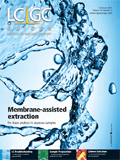Subcontract for chemical agent detector
Bruker Daltonics has announced the receipt of a $1.7 million subcontract award from the US army through a lead systems integrator. This award is for the company's RAID-M handheld chemical agent detectors.
Bruker Daltonics has announced the receipt of a $1.7 million subcontract award from the US army through a lead systems integrator. This award is for the company's RAID-M handheld chemical agent detectors.

The systems are intended for the National Guard WMD Civil Support Teams' (CST) Analytical Laboratory System (ALS) and will provide real-time chemical screening on site for the CST response mission. Delivery of most of the systems is expected by the end of 2007.
For more information please visit the company's website at www.bruker-biosciences.com
Licensing agreement
Rosetta Biosoftware has announced that Esai licensed the Elucidator system for differential protein expression analysis and biomarker discovery. Esai is a Japanese pharmaceutical company and will be using the system in the Laboratory of Seeds Finding Technology to support LC–MS quantification methods for identifying potential neurology biomarkers.
The senior scientist at the Laboratory of Seeds Finding Technology, Yoshiya Oda, stated, "The Elucidator system will be an important tool for enabling quantitative methods and characterizing cancer proteomes by multidimensional LC–MS–MS."
For more information visit the companies' websites at www.esai.co.jp/index.html and www.rosettabio.com
Filling in the Planck
It has been revealed that the Max Planck Institute is enhancing its research on neurodegenerative diseases through the addition of a Waters Synapt High Definition MS (HDMS) system.
The institute's Department of Cellular Biochemistry recently took delivery of Waters' HDMS system to study the role of proteins in causing brain-wasting diseases including Huntington's Disease. Research focuses on the understanding of the mechanisms by which molecular chaperones mediate protein folding and inhibit misfolding in neurodegenerative diseases. The Synapt system will be used to analyse the large protein complexes, and their subunit composition, that are involved in such diseases.
The research group want to gain greater insight into protein folding, assembly and aggregation pathways by being able to resolve, identify and characterize intermediates based on differences in conformation. Dr Manajit Hayer-Hartl commented, "We will follow folding and/or aggregation pathways in the presence or absence of chaperone systems in combination with hydrogen/deuterium exchange technology."
For more information visit Waters' website at www.waters.com
Networking sessions at Pittcon 2007
The Pittsburgh Conference has released the topics for the first annual Conferee Networking Sessions, which have been added to the Pittcon 2007 Technical programme. These sessions are open at no additional expense to all registered attendees and conferees will be able to network with others working on similar problems in their field of interest.

Suggestions for topics were submitted by conferees in late autumn and the Pittcon Committee selected eight of them as a pilot for this year's programme. One of the highlights will be featured on Monday 26 February, when Chapin Rodriguez from the American Chemical Society will be facilitating a session titled "Instrumentation Challenges for Developing Countries". Other topics to be featured this year include HPLC/MS User Forum (Tyco Healthcare Mallinckrodt), Electronic Nose and New Technologies of e-Nose to Improve Odour/Flavour Analysis for Formulation Development and Routine Quality Control (Alpha MOS) and Use of LC–MS and New LC Technologies to Improve Efficiency in Pharmaceutical Development (Eli Lilly Company).
For complete details and schedules please visit the organization's website at www.pittcon.org

A Novel LC–QTOF-MS DIA Method for Pesticide Quantification and Screening in Agricultural Waters
May 8th 2025Scientists from the University of Santiago de Compostela developed a liquid chromatography quadrupole time-of-flight mass spectrometry (LC–QTOF-MS) operated in data-independent acquisition (DIA) mode for pesticide quantification in agriculturally impacted waters.
Investigating 3D-Printable Stationary Phases in Liquid Chromatography
May 7th 20253D printing technology has potential in chromatography, but a major challenge is developing materials with both high porosity and robust mechanical properties. Recently, scientists compared the separation performances of eight different 3D printable stationary phases.

.png&w=3840&q=75)

.png&w=3840&q=75)



.png&w=3840&q=75)



.png&w=3840&q=75)









